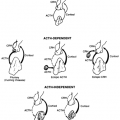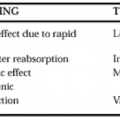SHORT-TERM REGULATION OF APPETITE
Part of “CHAPTER 125 – APPETITE“
The mechanisms involved in the regulation of appetite during a meal (short-term regulation) differ from those acting over a longer period in the control of energy homeostasis (long-term regulation) (see Fig. 125-1). Short-term regulation of appetite serves to adjust food intake to the immediate need for nutrition. Hunger is elicited by the contractions of the empty stomach. A transient decline in blood glucose, as proposed by the glucostatic hypothesis, is also involved in short-term regulation of hunger and meal initiation. Satiety mechanisms involve gastrointestinal peptides that signal satiety and contribute to meal termination when released in response to food ingestion. These satiety factors support the gut peptide hypothesis. In addition, gastric distention produces satiety through activation of the vagal nerve.7
Stay updated, free articles. Join our Telegram channel

Full access? Get Clinical Tree





